Countdown is a global initiative to accelerate solutions to the climate crisis. Watch the talks, interviews and performances from the Countdown Global Launch at ted.com/countdown.
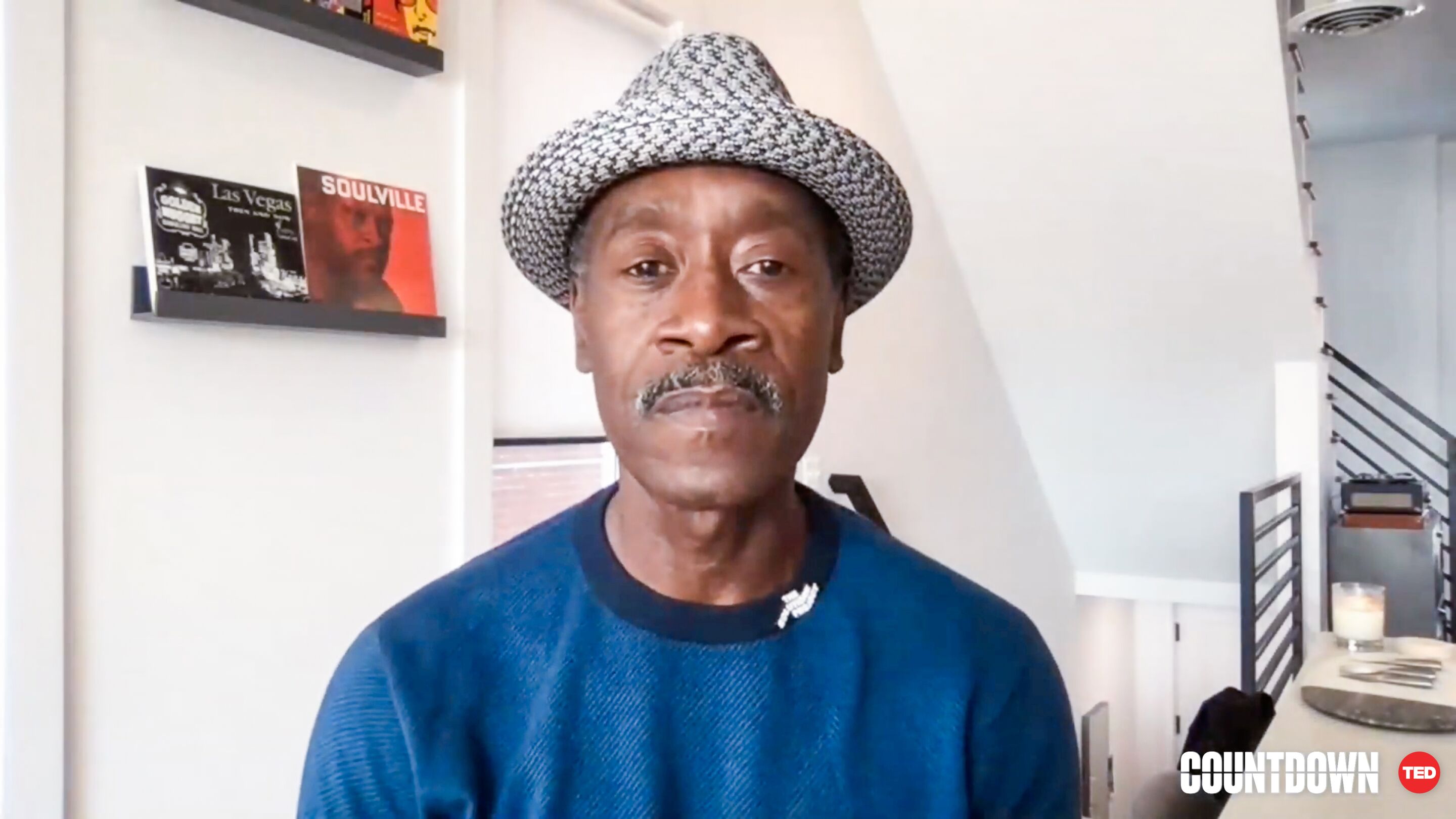
Actor, author and director Don Cheadle cohosts session 1 of the Countdown Global Launch on October 10, 2020. (Photo courtesy of TED)
Today, 10.10.2020, is the climate’s day of destiny: the Countdown Global Launch, a call to action on climate change and the first-ever free TED conference.
Launching Countdown means asking ourselves the big questions: What’s the state of the climate today? How are we going to achieve a net-zero future? How do we center climate justice in our work? We heard from experts, policymakers and activists in this opening session, cohosted by actor and director Don Cheadle and actor and climate change advocate Mark Ruffalo, who reflected on their own love for the environment, as people who grew up in the midwestern United States.
The opening remarks were followed by an introduction from head of TED Chris Anderson and head of Future Stewards Lindsay Levin, who teamed up to create Countdown a year ago. They laid out what we’re hoping to achieve at the Countdown Global Launch: taking a deep look at what it will take to tackle climate change, specifically by harnessing creativity and innovation to cut carbon emissions in half by 2030 and get to net-zero by 2050.
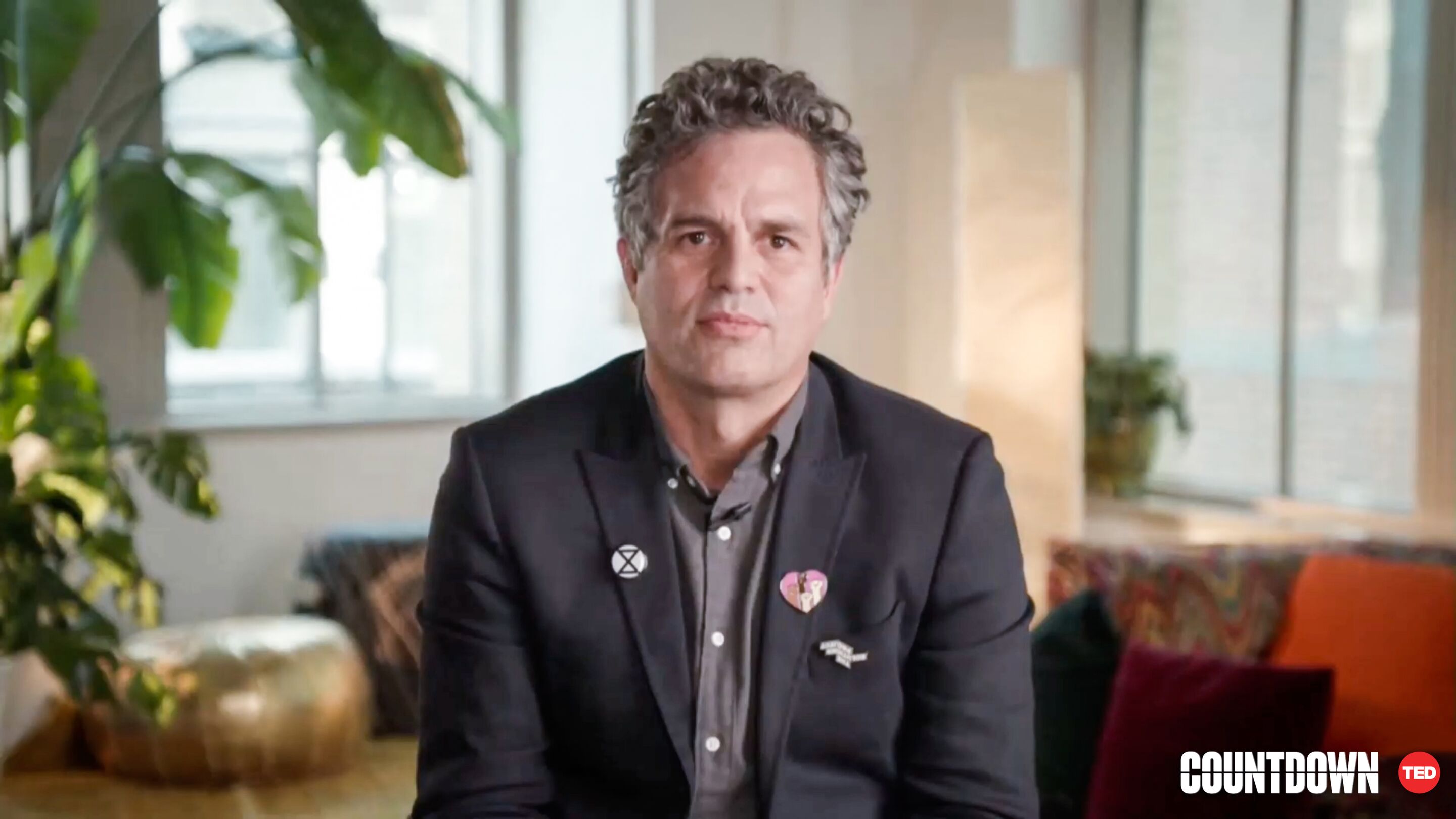
Actor, director and climate change advocate Mark Ruffalo cohosts session 1 of the Countdown Global Launch on October 10, 2020. (Photo courtesy of TED)
The talks in brief:
Johan Rockström, climate impact scholar
Big idea: Earth’s climate has reached a global crisis point. We have 10 years to avoid irreparably destabilizing the planet.
How? In his TED Talk from 2010, Johan Rockström outlined nine planetary boundaries that keep earth’s ecosystems in a state of stability, allowing humanity to prosper. At that time, evidence showed that just one planetary boundary was at risk of being breached: Arctic sea ice. A decade later, Rockström warns us that nine out of the 15 big biophysical systems that regulate climate — from the permafrost of Siberia to the great forests of the North to the Amazon rainforest — are approaching tipping points, which would create a “hot-house Earth” largely uninhabitable for humanity. “These systems are all linked like dominoes: you cross one tipping point, you lurch closer to others,” Rockström says. So what are we to do? Over the next 10 years, we need to get serious about stabilizing the planet. Rockström proposes a model of “planetary stewardship” rooted in science-based targets for all global commons (i.e., the ecosystems that support the planet’s stability) and an economy based on well-being, which would decarbonize big systems like energy, industry, transport and buildings. “This is our mission,” he says. “To protect our children’s future.”

“Cities are starting to flip the script on climate change, proving to be part of the solution and not just the problem,” says climate and data scientist Angel Hsu. She speaks at the Countdown Global Launch on October 10, 2020. (Photo courtesy of TED)
Angel Hsu, climate and data scientist
Big idea: Tackling climate change must start in cities, and many around the world are already implementing ambitious plans.
How? Cities are at the highest risk of the damaging effects of climate change: all-time temperature highs, sweltering humidity, rising sea levels, suffocating air pollution. The irony is that cities are also the biggest offenders in causing this shift in climate, says Angel Hsu. Cities pump out 70 percent of the world’s total carbon emissions and gobble up between 60 to 80 percent of global energy resources. The good news, Hsu says, is that cities are quickly becoming leaders in the fight against climate change by forging new, low-emission pathways. Already, 10,000 cities have pledged to undertake sweeping climate initiatives. Now Hsu asks: What impact could we make if 20,000 cities made these same efforts? At the same time, she points out that cities must fairly and equitably implement these initiatives across all populations, especially for those most at risk. For example, expanded bike paths in Latin America will connect more people to jobs, schools and parks, while in Africa, green power grids have the ability to electrify nearly 73 million power-deficient households. Cities may be causing climate change, but they also have the power to mitigate it while raising the quality of life for their populations.
António Guterres, Secretary-General of the United Nations
Big idea: The race to a zero emission world is under way. If we don’t act now, this coming century may be one of humanity’s last.
How? As the world continues to struggle through the COVID-19 pandemic, António Guterres urges us to use this moment to rebuild with ambitious climate action in mind. Momentum is increasing, he says, as companies, cities and countries commit to reaching net zero emissions by 2050. He outlines six actions that governments can take to keep ramping up their climate ambitions: invest in green jobs, drop polluting industries, end fossil fuel subsidies, put a price on carbon, take climate risks into account in all financial and policy considerations and work together in solidarity — leaving no one behind. During next year’s Countdown Summit (October 12-15, 2021, Edinburgh, Scotland), Guterres expects to share an actionable blueprint for a net-zero future and celebrate the progress that’s already been made. “We can only win the race to zero together,” he says. “So I urge you all to get on board. The countdown has begun.”
Climate Action Tracker, an interactive online map that monitors the climate commitments of countries worldwide
Big idea: With the 2015 Paris Climate Agreement, 197 countries agreed to set emission targets that would limit global temperature rise to 1.5 degrees Celsius by capping greenhouse emissions at “net zero” — or absorbing as much carbon as they emit — by 2050. So far, only two countries (Gambia and Morocco) are hitting their targets, while the biggest emitters are falling flat, or ignoring their goals entirely. How can we hold these countries accountable?
How? Enter the Climate Action Tracker, an interactive tool that allows citizens to track the climate commitments and actions of the 36 countries that emit 86 percent of global greenhouse gases. Emissions are still rising, according to the Tracker, and there’s more bad news: the US has withdrawn from the Paris Agreements, and while China’s goals alone could drop global warming by .3 degrees, their actions are troubling, as they continue to invest in new coal plants while touting green energy. The good news: the Tracker reveals that many cities and businesses within some of the biggest economies are committed to green electricity and emission-free transportation and construction.
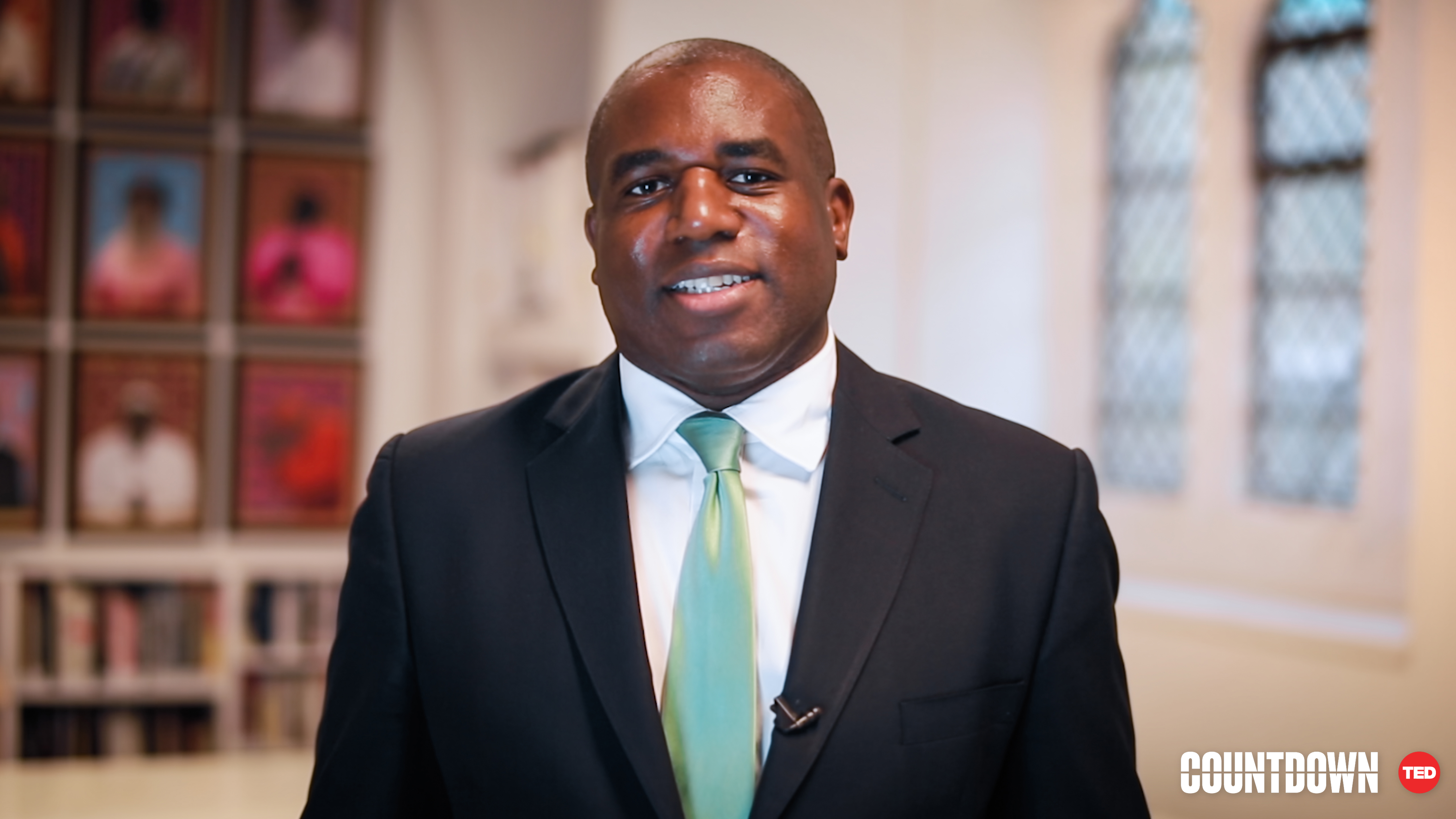
“The exploitation of our planet’s natural resources has always been tied to the exploitation of people of color,” says member of the UK Parliament David Lammy. He speaks at the Countdown Global Launch on October 10, 2020. (Photo courtesy of TED)
David Lammy, Member of Parliament, UK
Big idea: There cannot be true climate justice without addressing racial, social and intergenerational issues. The global community must invite Black voices to lead in repairing our systems, society and planet.
Why? Black people and people of color are most at risk of climate change due to cheap housing, polluted neighborhoods and other systemic inequities. So where are all the Black climate activists? According to David Lammy, the first Black MP to hold the Justice post in British Parliament, racial justice and climate justice have been viewed as distinct problems, with equality advocates seeing environmentalism as elitist while white climate activists rarely enlist the support of Black voices. Lammy sees the climate emergency as the direct result of generations of violent abuse, disregard and theft of minority communities. “The climate crisis is colonialism’s natural conclusion,” he says. To repair the Earth, we must solve the racial, social and economic injustices that plague communities of color. Lammy calls for environmental groups, international organizations, the press and everyone in between to support Black leaders on climate, including awarding scholarships for people of color, enacting stronger international laws to support vulnerable communities and even moving company headquarters to the urban areas most affected by the climate emergency.
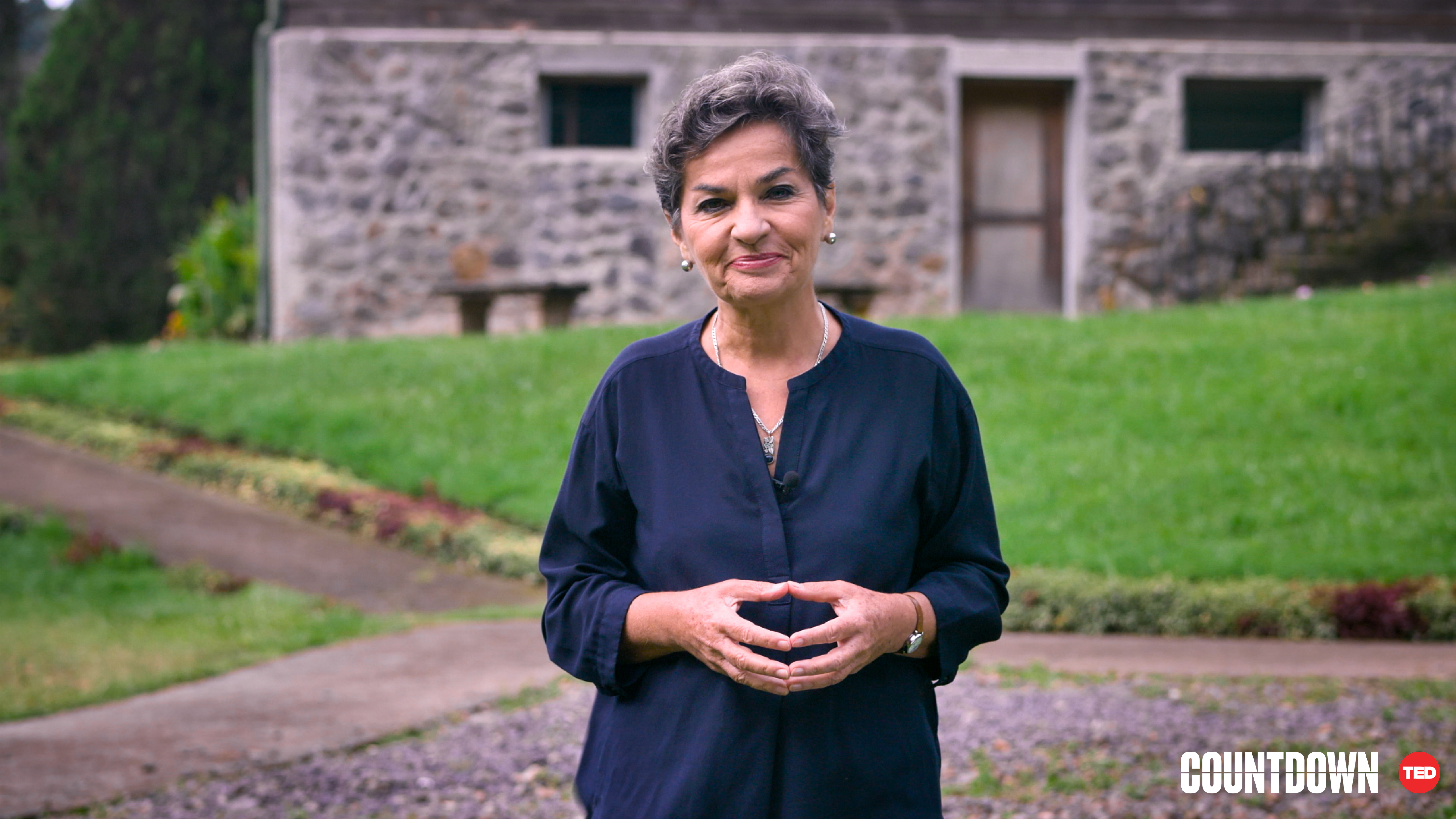
“From my father, I learned stubborn optimism, the mindset that is necessary to transform the reality we’re given into the reality we want,” says climate advocate Christiana Figueres. She speaks at the Countdown Global Launch on October 10, 2020. (Photo courtesy of TED)
Christiana Figueres, stubborn optimist
Big idea: To face a problem as big as climate change, the world needs to adopt a new mindset: stubborn optimism.
How? Christiana Figueres, the climate leader who helped broker the historic Paris Agreement in 2015, learned stubborn optimism from her father, José Figueres Ferrer. He refused to give up on his country, Costa Rica, when it was thrown into political crisis in 1948. Instead, he took action, set out to restore democracy and bring peace to his homeland and was elected as the country’s president three times. Today, in the face of an extreme climate crisis that threatens the globe, Figueres champions her father’s special brand of optimism. “Our optimism cannot be a sunny day attitude,” she says. “It has to be gritty, determined, relentless. It is a choice we have to make every single day. Every barrier must be an indication to try a different way. ” With a remarkable fighting spirit and an unwillingness to accept defeat, she urges everyone to envision the future they want for humanity — and work to make it reality.
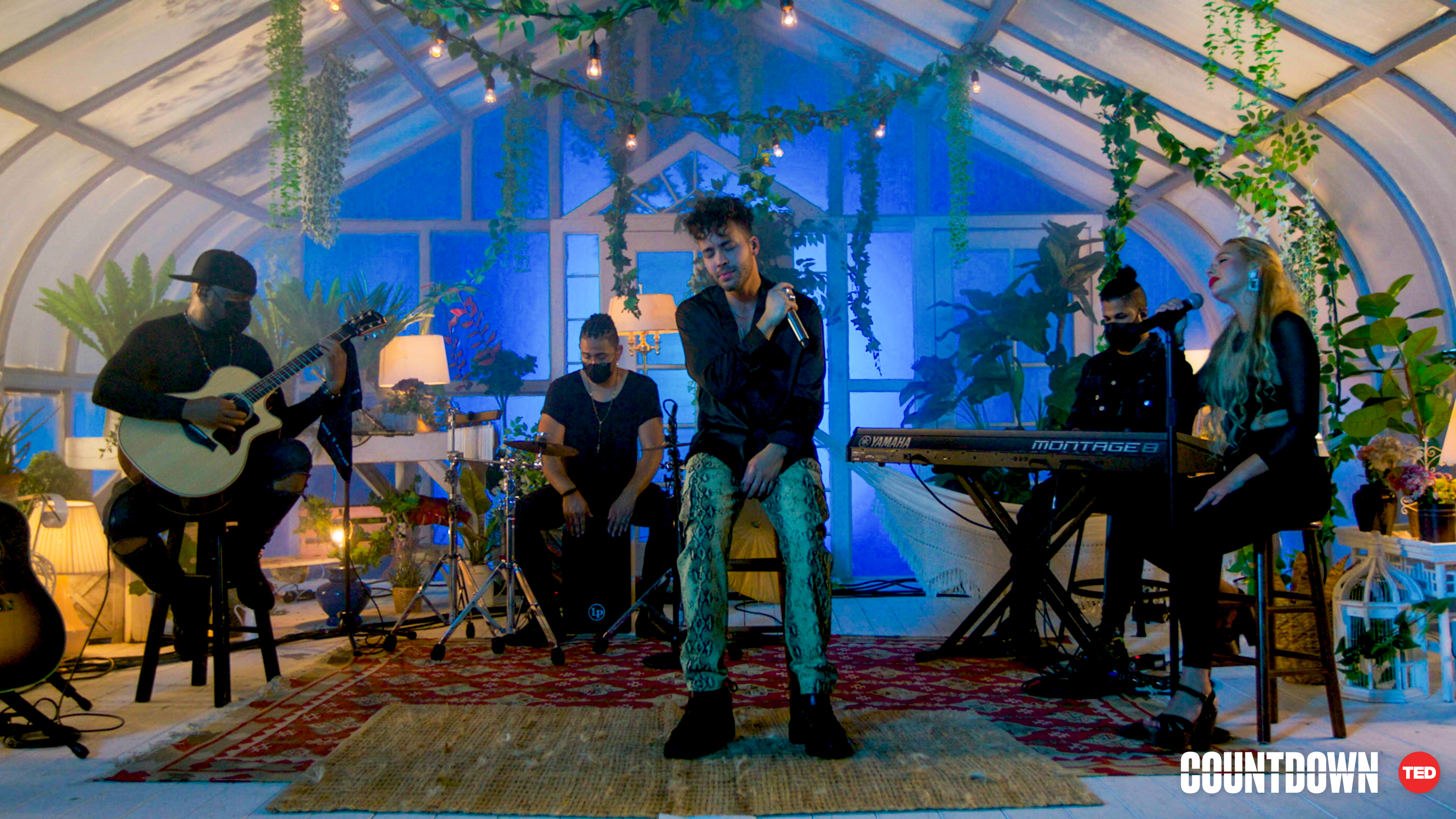
Prince Royce performs four fan favorites at the Countdown Global Launch on October 10, 2020. (Photo courtesy of TED)
Bronx-raised Latin music superstar Prince Royce also adds his voice to the call for action on climate. “Climate change is the defining issue of our time,” he says. “History is defined by moments when people rise up and cause change. The decisions we make as individuals add to this collective forward motion.” Backed by his band (donning face masks), he performs fan favorites “Luna Negra,” “Carita de Inocente,” “Corazón Sin Cara” and “Darte un Beso.”